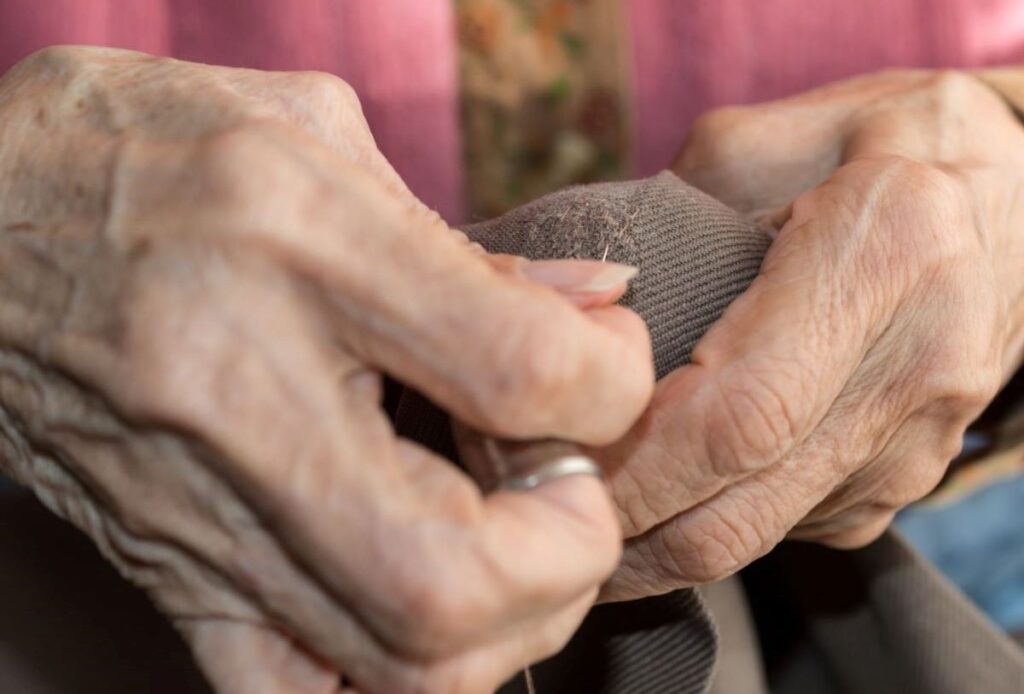Frugal Advice That Never Gets Old – 47 Tips From Our Grandparents’ Era
This website may earn commissions from purchases made through links in this post.
Some advice never gets ‘s old. Here are 47 depression-era frugal tips that will help you save money on the everyday little things.
Do you feel that frugality is a dying art?
Or maybe you already put into practice many of the following frugal ideas.
Necessity meant that our grandparents (or great-grandparents or parents, depending on your age) had to be frugal. And they had to stretch every penny as far as possible.
There’s one common theme that runs through all of the following depression-era frugal tips, and it’s this: waste nothing.
In a time of scarcity, no one could afford to waste a thing.
In some ways, it was easier back then: things were built to last, and they were built to be repaired.
Now things are designed to be wasted. But that doesn’t mean we have to buy into the consume-and-waste cycle. It just means we have to be a bit savvier with how we spend our money and what we do with the things we buy.
The frugal tips from our grandparents are even more relevant than ever.
Frugal Living Tips From the Great Depression
1. BUY LESS – Spending begets spending. Sometimes it feels like the more you buy, the more you need. Spending less and having fewer things stops this cycle.
2. MAKE DO – the flip side of buying less is to make do with what you have. That means getting creative with what you have already.
3. DIY – We’ve lost a lot of the skills we used to have. DIYing is a great way to gain back those skills. Learn to lay tiles or pavers, paint, cook, unblock the drain, sew, grow food, an hang pictures or doors.
4. MAKE YOUR OWN – Need a new dining table? Or a new bed frame? Why not try your hand at making your own? Have you seen the Ana White website? Lots of amazing free projects that show a woman is as capable with a hammer and saw!
5. REPAIR – It’s too easy (and often cheaper, unfortunately) to toss what’s broken and buy a new one. But if you can, and it’s feasible, repair instead of replace. It reduces landfill, which is also an important consideration.
6. MAINTAIN WHAT YOU HAVE – One of the most important ways to save money is to maintain what you own so that it lasts as long as possible. A maintenance schedule helps you keep track of maintenance tasks. A stitch in time…
7. REPURPOSE REUSE – In the past, nothing was thrown away; everything had a second or even third life. Bread bags can be used as freezer bags or garbage bags. Old clothes can use cut down into new clothes or used in quilting, or in cut into rags (saving the buttons and zips, of course). Containers, jars and boxes can be repurposed for storage.
8. DITCH DISPOSABLES – On the other hand, the first ‘R’ in the maxim is to reduce, so it’s better to avoid than reuse or repurpose. Disposables force you to spend money on the same thing week in, week out. Reusable alternatives mean you have a once of payment, saving you money over the years.
9. MEND CLOTHING – and make it last as long as possible by following washing instructions and line drying when you can.
10. SEW YOUR OWN – and if you make your own clothing, linen, bedspreads etc., you’ll be more likely to want to make it last as long as possible after putting in all that work.
11. BUY SECOND HAND – and save money, reduce consumption and keep things out of landfill.
12. WEAR AN APRON – an apron will protect your clothes from stains, helping them to last longer.
13. LEARN A HANDICRAFT OR TWO – handicrafts make useful hobbies. Avoid boredom and end up with something useful as an end product.
14. INCLUDE HOME REMEDIES – I’m not against modern medicine, it’s a wonderful, life-saving thing, and we use it when needed. But there’s a place for home remedies, too, and they can complement modern medicine when it comes to symptom management.
15. CLEAN NATURALLY – Natural, homemade cleaners are usually just as effective as chemical cleaners, but they are cheaper and reduce the toxic load in the home.
16. USE A HOT WATER BOTTLE – a cheaper way to warm the bed and stay warm in winter.
17. PUT ON A JUMPER (SWEATER) – layer layer layer before turning on the heating.
18. SPEND MORE TIME OUTSIDE – too hot inside? Take your inside work outside and enjoy a cool breeze in the shade.
19. HAND WASH – rather than relying on the washing machine all the time. If you’ve ever wondered how to wash clothes without electricity, here’s how to do it.
20. WEAR CLOTHES MORE THAN ONCE – if the clothes aren’t dirty, wear them again before washing and reduce the number of washes you do.
21. WEEKLY WASH DAY – having a weekly wash day may seem a bit outdated, but in a time when people wash towels and clothes every single day, washing things like towels and linen weekly instead of daily will reduce your number of washes.
22. HANG CLOTHES TO DRY – instead of using the dryer. Raining? Here are some ways to dry clothes without a dryer.
23. BAKE WHEN THE OVEN IS ON – make the most of the oven and throw in a slice or some bickies (cookies) while you’re baking something else.
24. HAVE A BAKING DAY – Ever read old books, and they’ve always got a chocolate cake or some bickies in a tin in the pantry. That’s thanks to the weekly bake day. We have the benefit of being able to freeze our baking for later.
25. PRESERVE – Freeze fruit and vegetables or make jams and other preserves so that today’s harvest doesn’t go to waste and you can make the most of it out of season.
26. SAVE GREASE – and cook your food in the saved fat. Potatoes fried in bacon fat – cheap and delicious.
27. HAND WASH DISHES – washing in a dishwasher may save you water, but it costs extra electricity. Instead, hand wash dishes in minimal water to save.
28. FORAGE – an almost forgotten skill, feed yourself for free with plants that grow around your neighbourhood (not the neighbour’s veggie patch, though). Just make sure you know how to identify plants before eating them.
29. SCRAPE THE LAST FROM THE JAR – a small rubber spatula is the perfect tool for this. Making jam milkshakes with the last bit in the jar is another alternative.
30. HAND MIX – or grate or chop. Use manpower and save on electricity, expensive appliances, and the need for the gym.
31. COOK FROM SCRATCH – and eat healthy food that’s cheaper than processed and packaged food.
32. HEAD TO TAIL EATING – Some of the most nutritious parts of an animal are the organ meat, and it’s cheap but rarely eaten. In the past, no part of the animal go wasted – from sheep’s head stew to making stock from the bones and sausages from the intestines. My mum’s lambs fry and bacon recipe is the most popular article (and video) on the blog.
33. DON’T BUY WHAT YOU CAN MAKE – yoghurt is a good example of this. It’s easy to make at home and costs a fraction of the price of store-bought. A modern cheat is using an Easio making. It does make yoghurt making easier.
34. MAKE SOAP – most soap from the supermarket is stripped of glycerine (the good stuff for your skin) and includes chemicals. Make your own better-quality soap. If you use scraps, it will cost you next to nothing.
35. DRY YOUR SOAPS – Soap, whether handmade or purchased, will last longer if it has been dried. Place your soap in your clothes cupboard to dry out, give your clothes a nice smell and ward off silverfish.
36. REUSE WRAPPING PAPER AND CARDS AND SCRAP PAPER – back to waste nothing. Save on wrapping presents by keeping and reusing wrapping paper and cards. Use junk mail as scrap paper and envelopes for the shopping list.
37. CURL YOUR HAIR WITH RAGS – instead of using a curling iron and save electricity.
38. SQUEEZE OUT THE LAST OF THE TOOTHPASTE – by rolling the tube to use up every last drop. Use a q-tip to get out the last of the lipstick. Cut open the shampoo bottle or add water to use the last drop of shampoo.
39. FLUSH LESS – If it’s yellow, let it mellow; if it’s brown, flush it down. Do I need to say more? A brick or a bottle of water in an old-fashioned toilet will reduce the amount of water per flush, but if you have a modern, dual-flush toilet, this isn’t necessary.
40 SHOWER LESS – eww, right? But why shower on days that you’ve spent all day lounging around at home? People haven’t always had (or needed) the luxury of showering every day. A sponge bath will save water and is sufficient to get clean on many days.
41. REUSABLE FEMALE HYGIENE PRODUCTS – thanks to modern updates, this doesn’t mean using rags every month. Thanks to menstrual cups and period undies, you can opt for products that are better for the environment, save you money over the long run, and are way more comfortable than their disposable counterparts.
42. USE THE LOCAL LIBRARY – the local library has so much more than just books. Watch DVDs, stream movies, music, and audiobooks, use the computers, attend classes, borrow puzzles and board games, and listen to music. And most importantly, use the books to learn new skills.
43. ENTERTAIN YOURSELF IN USEFUL WAYS – Useful hobbies like gardening, sewing, handicraft, woodwork, tinkering, DIY etc. will not only keep you entertained, they will make you happier and save you money.
44. FREE ENTERTAINMENT – Instead of spending time at the shops, cafes, theme parks or even in front of the TV or Xbox, frugal entertainment includes hanging with friends, picnics at the park, a day at the beach, playing board games, reading, telling stories.
45. COMMUNITY INVOLVEMENT – Getting involved in your local community is a great way to meet new people, be happier, give back to the community and enjoy yourself at the same time without spending money. The community you build will also be there for you when times are tough, although that shouldn’t be a primary motivator.
46. GROW YOUR OWN FOOD – Even just a few herbs on a windowsill is a good start towards supplementing your budget with your own fresh produce. Organic food comes at a premium, but homegrown organic food will save you money.
47. COMPOST – In the spirit of waste not, composting scraps to add to your veggie garden is the ultimate in recycling and saving money.
Reducing waste and being savvy with your money never gets old. These frugal tips from the great depression will never go out of date.








Great post melissa!It was like going back to my childhood and observing the way my mum did everything(She was a child during WW2).Its funny now because i am now trying to adopt as many as these tips as possible…wish I’d paid more attention when Mum was sewing/knitting etc as now these are skills i can see really benefit a family.I agree too that its not always about money and saving and the aquisition of stuff but about being satisfied with what we have.Thankyou for this timely reminder.
Hi Shauna,
Thanks
My dad was a WW2 child too, and a lot of these tips we grew up with also. I wish I’d learned more from him too.
A couple you could add:
Buy quality. There are lots of cheap imported goods now but they don’t last. Buying quality might double the initial price but if it lasts 3 times as long you are ahead of the game.
For all the blokes use shaving soap and a brush rather than foam or gell. Each soap block last me more than a year!
Hi Brian,
Great additions!
Hubby has a beard, so even less shaving :) although he also uses the old fashioned brush and soap when he does shave.
Isn’t shaving cream just for kids craft and activities on Pinterest? ;)
What a refreshing read! I have been penny pinching to pay off debts ( not self inflicted) and maintain that my quality of life is not co.promised…this article reminds me of the fun of being inventive. My tech crazy kids love our weekly family night…board games and my friends and I catch up over a come dine with me style rota. We also enjoy making tray bakes from leftover biscuits cereal and melted chocolate. I was brought up by my gran and really appreciate being able to see cook knit and bake.
Hi Suzanne, thanks. Your household sounds awesome :).
As a renter I have had to clean a handful of different toilets and have found that the toilets which have been used with a “let it mellow” policy never seem to get clean. There is a permanent ring where the water level is constant. The urine has etched into the glaze and the ring which remains never goes away and seems to collect everything. A good cleaning makes the ring lighter but never gone. I guess if you want to clean your toilets every day maybe that wouldn’t happen. But who wants to do that??
You’re right, who wants to clean the loo everyday!! We don’t have the problem of a permanent ring though.
While raising 4 girls, money was tight. instead of expensive products, l opted for their basic counterparts: witch hazel as an astringent for face, hair, bug bites and sunburns; ammonia for cleaning (and bee stings!); bleach to disinfect; comet to scrub stubborn stains on hard surfaces and hydrogen peroxide for blood stains and wound care. (Never mix bleach and ammonia, it creates a deadly gas).
We too let what is yellow mellow. We started flushing only when we needed to during the draught when water was too precious to be flushed down the sewer at every opportunity. The toilet has developed a slight ring of discolouration but hey what is more important, a pristine toilet or water saved? In my quest to be sustainable and frugal I also don’t use commercial toilet cleaners. Instead the toilet is cleaned with ‘soap and water’. I use a couple of tablespoons of soap nut concentrate and brush. Sometimes I give it the bicarb treatment followed by vinegar rinse to make it smell nice. It all works a treat. Best of all I am not flushing potent chemicals down the sewer. This is important as not all chemicals breakdown and not all are filtered out at sewerage treatment plan. What ends up in the oceans affects marine life and ultimately us through the food chain.
Vinegar and bicarb are great toilet cleaners! We use them too. Water conservation is important, especially as we’re going into another drought it seems.
I use a pumice stone to clean the ring in my toilet. Works great!
Put on some plastic gloves and use a light sand paper, or a sand paper block. It will rid u of any ring in ur potty. Most of the time Lime away or other chemical that removes lime or rust will do the trick.
Really enjoyed this article. Off to dry some soap now..
Please do not reuse/store bacon grease unless it is nitrate free. Regular bacon grease contains a concentrated form of nitrates which has been associated with causing cancers. Bacon grease was a collected staple in my parents house and although a great flavour enhancer think twice do some research online an leave this off the frugal list. Actually the price of bacon puts this idea as non frugal anyways.
I remember bacon grease being strained and saved for cooking and lard used for baking. but the redeeming factor was home butchering and processing. I doubt a nitrate had ever been heard of! I have to agree, I would only use grease now as a very very seldom taste treat.
It’s such a shame we have to worry about such things!
I’m glad I found your blog…Frugal living is thriving…living how you want to leave & saving money to spend on the important things, not just throwing it away.
regional dialect question for you–What’s a bickie? Cookie or biscuit? I am in North America. My parents were depression babies and I just normally do much of what is on your list. Funny frugal story–Around 1995 a young friend explained that her granny was slipping mentally because she kept wrappers from butter sticks in the freezer. I had to explain baking and greasing muffin tins to her.
Bickie is Australian slang for biscuit, but our biscuits are like your cookies. I keep my butter wrappers in the fridge ;)
Hi Gail! I remember doing that when our oven worked, LOL! Still use it for greasing pans and use the last odd slice of butter as cooking butter for rice or sautèing onions, etc.
If you are able to save a few bucks to put away for a rainy day through frugal practices, some person who has frittered all her/his money away will show up at the door, hand open for a hand out.
Better them than you begging for help. If that ever happens, teach them what you have learned.
I used to love liver, but I don’t eat organs any more, unless I’m buying organic. Organs collect the pesticides etc. Some of the tips are time consuming. Back in grandma’s day, it was unlikely that she worked. So she had time to do the things on this list. Many of us don’t have the time. That doesn’t mean you can’t use some of the less time consuming tips, though.
Hi Lonnie, thanks for your comment. Yes, they are time consuming. It can be hard finding the balance between convenience and frugality sometimes :).
Another frugal tip is to own if you are lucky enough,a soapshaker,and use as washing up in the sink,I use mine with my home made soap,and use laundry soap when I’ve run out.I also use all of your principles for frugal living,We meal prep as well,and put excess to freezer for a no cook day which is lovely too.Compost all scraps to garden all year round for beautiful soil for growing in spring,and even have potatoes in for winter.We live in Tasmania Australia.
Only soap shaker I could find was online and cost$40!! I tried grating Sunlight soap , put it in an old stocking, but it was not at all effective for washing dishes , Any suggestions? I’m really trying to avoid products in plastic bottles, so this is something I’d like to solve,
Save tin boxes (from cookies, etc.), canning jars and their lids and rings, rigid plastic boxes of various sizes (the ones good chocolates come in), and even shoe boxes. These all make great storage containers. You can also carefully disassemble small cardboard boxes to use as templates to make more boxes to use for containers for gifts, etc. You can use short ends (four to six inches) of pretty ribbons as bookmarks. Check the curbs on garbage day. It’s amazing the good things that are in perfect condition that you will find there that people just don’t want any longer. Sometimes retailers will let you have their hangers for free.
Hi Janna, they are some great tips. Thank you for sharing. Forero Rochere boxes make particularly good storage boxes. :)
I have to stretch every dollar,I am a widow.I raised 5 kids alone and really had to watch every penny.I made their clothes made gifts sewed for people I also canned food and baked everything from scratch. Made large amounts of soups, sauces, meatloaf and plenty of beans and rice. I did knit sew and crochet things we needed.I shopped at yard sales bought alot of material yarn and thread patterns buttons etc.I made prom,navy ball gowns dresses.If we needed it I would make it. Also raised them without a car. Too buses, or walked.Only disposable items I bought was to and femine products. Paper towels where a waste, I used rags. PEOPLE waste too much. I too miss the days of repair shops. Also not alot of dry cleaners do not do repairs anymore.People just throw away.I love your way of thinking!
I hope your 5 kids kick and help take care of your needs and WANTS. It’s the least they can do for all you did for them and taught them! Be well!
I love this list. I look to the past alot in trying to simplify my life. My sons bed broke just before christmas and after spending a month trying to find another one at a decent price i realised i could just fit new legs onto the base of his old one and make it last another few years. The head and foot boards i have listed for free for anyone who is crafty and wants to make a seat or planter bed from them. I try to let others know these tips when i can on my blog, but i love hearing how others have solved waste problems also.
Great to hear your frugal skills!
I can relate to this. Our son’s bed broke last year too. It was my husbands from when he was a boy! Finding a bed the same quality was impossible unless it’s $$$$.
Perfect information during these uncertain times.
Hope it is helpful. Thanks Sandy.
I love reading these frugal tips. My mom and grandma taught me to paint furniture, re-use things such as jars and tins, shop thrift stores and yard sales and sew and mend. I quite enjoy it. I also like to cook from scratch and bake and grow plants and flowers
I love this article. I wish more preppers thought this way. Another way to save money is to eat organ meats. During the Depression; people served beef tongue for Sunday dinner. People rarely ate chicken. They were considered to be valuable livestock. Salt pork can be used as a bacon substitute
Reading those tips brought back so many memories of my grandmother. I found that I am doing most of them now too, without realising that I was following in her footsteps.
Many thanks for reminding me of this.
Saving water, these days, is more important than the minimal amount you’ll save by not using your dishwasher,!if you’re lucky enough to have a dishwasher.
Excellent 👌👍. This article reminded me of my aunt’s and their wisdom or ” mother wit”. They were born in the 1940’s era. Thanks again, Gerry Mayo, Retired Therapist.
I would love tips on how to garden when you live in town and would literally need to build garden beds. Cheaply that is.
My Parents went through the Depression.
Many of these tips have been instilled in us.
You gave me many reminders.
I absolutely love the frugal issue, I remember! Thanks so much!